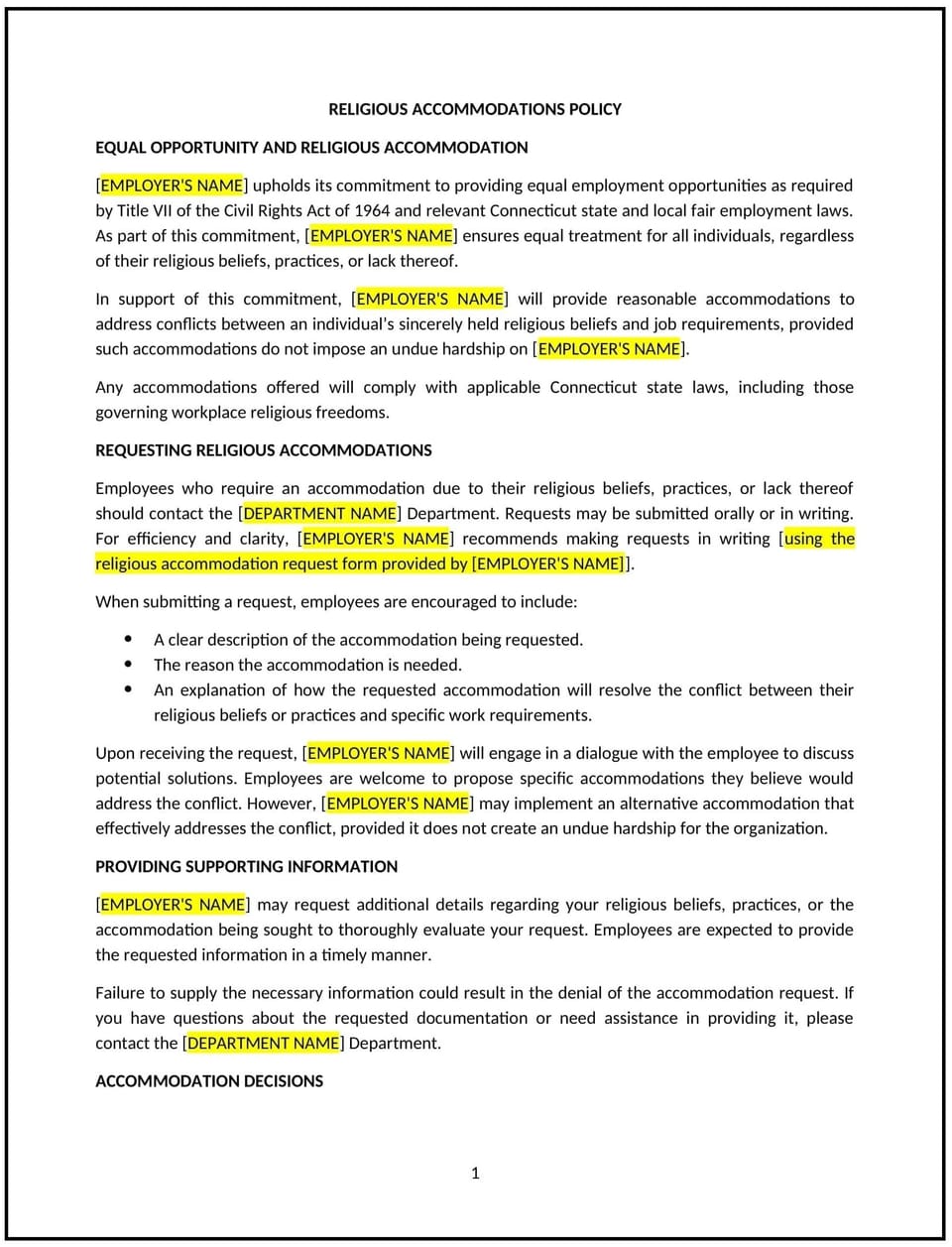Religious accommodations policy (Connecticut): Free template

Religious accommodations policy (Connecticut)
A religious accommodations policy helps Connecticut businesses ensure that employees’ religious beliefs and practices are respected and accommodated, as required by state and federal law. This policy outlines the company’s approach to providing reasonable accommodations for employees who need time off or modifications to their work environment for religious observances or practices.
By implementing this policy, businesses can foster a diverse and inclusive workplace, ensure legal compliance, and create an environment where all employees are treated with respect and fairness, regardless of their religious beliefs.
How to use this religious accommodations policy (Connecticut)
- Define religious accommodations: Clearly specify what constitutes a religious accommodation, such as time off for religious holidays, modifications to the work schedule, or changes to dress code or grooming policies to accommodate religious practices.
- Request process: Establish a clear and confidential process for employees to request religious accommodations, including how to submit a request and the information required to assess the need for accommodation.
- Evaluate requests: Outline the criteria the company will use to evaluate requests for religious accommodations, ensuring that each request is considered on a case-by-case basis and in accordance with legal requirements.
- Provide reasonable accommodations: Specify the types of reasonable accommodations the company may offer, such as flexible scheduling, time off for religious holidays, or changes to workplace attire or grooming requirements.
- Address undue hardship: Clarify that the company is not required to provide accommodations that would cause undue hardship to the business, such as significant disruptions to business operations or excessive financial costs.
- Ensure non-discrimination: Emphasize that employees will not be discriminated against for requesting religious accommodations and that any request will be handled fairly and respectfully.
Benefits of using this religious accommodations policy (Connecticut)
This policy offers several benefits for Connecticut businesses:
- Promotes inclusivity: By providing religious accommodations, businesses demonstrate their commitment to creating an inclusive workplace where all employees are respected, regardless of their religious beliefs.
- Complies with legal requirements: The policy helps businesses comply with federal and state laws, including Title VII of the Civil Rights Act of 1964, which requires employers to accommodate employees’ religious practices unless it causes undue hardship.
- Reduces legal risks: Clear guidelines for accommodating religious beliefs help reduce the risk of legal claims related to discrimination or failure to provide reasonable accommodations.
- Enhances employee satisfaction: Offering religious accommodations supports employees’ ability to observe their faith without sacrificing their job, contributing to higher job satisfaction, engagement, and retention.
- Fosters a positive work environment: The policy encourages respect for diversity and creates a more positive, harmonious work environment by addressing employees’ religious needs in a fair and transparent manner.
Tips for using this religious accommodations policy (Connecticut)
- Communicate the policy clearly: Ensure that all employees are aware of the policy and the process for requesting religious accommodations, so they feel comfortable coming forward with their needs.
- Train managers and HR: Provide training for managers and HR staff to ensure they understand the legal requirements related to religious accommodations and can handle requests respectfully and fairly.
- Document requests: Keep accurate records of all requests for religious accommodations and the accommodations provided, while maintaining confidentiality and protecting employees' privacy.
- Review requests in a timely manner: Process requests for religious accommodations promptly to ensure employees can observe their religious practices without unnecessary delays.
- Review periodically: Regularly review the policy to ensure it remains compliant with changes in Connecticut laws, federal regulations, or company practices, and to address any feedback from employees.
Q: How does this policy benefit my business?
A: The policy promotes inclusivity and diversity by ensuring that religious accommodations are provided fairly and in compliance with state and federal laws, reducing the risk of legal challenges and fostering a more positive work environment.
Q: What types of religious accommodations are covered by this policy?
A: Religious accommodations may include time off for religious holidays, flexible work schedules, modifications to dress codes or grooming policies, or other adjustments needed to support employees’ religious practices.
Q: How do employees request religious accommodations?
A: Employees should submit a request for religious accommodations to HR or their supervisor, providing information about the specific accommodation needed. The company will evaluate the request and work with the employee to provide a reasonable accommodation.
Q: Can religious accommodations be denied?
A: Religious accommodations can be denied if they would cause undue hardship to the business, such as significant disruptions to operations or excessive costs. The company will work with employees to find an alternative solution whenever possible.
Q: How often should this policy be reviewed?
A: The policy should be reviewed annually or whenever there are updates to Connecticut laws, federal regulations, or company practices to ensure it remains compliant and effective.
This article contains general legal information and does not contain legal advice. Cobrief is not a law firm or a substitute for an attorney or law firm. The law is complex and changes often. For legal advice, please ask a lawyer.


